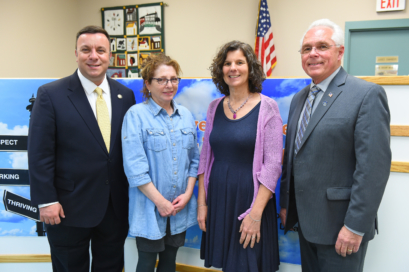A forum on the Olmstead Act
Sep 9,2016

Have you heard of the Olmstead decision? In a nutshell, it came about when two women, Lois Curtis and Elaine Wilson, both with a diagnosis of mental illness and intellectual disabilities were in and out of psychiatric hospitals. When at home, they did not have the care needed. They’d end up in the hospital and the cycle began again. It was evident that they’d be able to do well in a community setting, provided they received the supports needed.
Under the Americans with Disabilities Act, the Supreme Court established that it is against the law for the state to discriminate against a person based on his or her disability. Since I said I’d offer a nutshell version, I’ll share briefly here, that since the 1990’s, efforts have been made to close institutions and institutional settings.
Let us fast forward to this past spring. We were invited to a Town Meeting to express our thoughts on the impact of the Olmstead Act on local communities. The forum was hosted by the Assembly Minority Task Force on Protecting the Rights of People with Developmental Disabilities. Members of the Assembly, Karl Brabenec and Clifford W. Crouch led the meeting. They were eager to give community members and leaders an “opportunity to empower the stifled voices and help create greater awareness of the shortfalls in the current transition process.” When I received the written invitation, and then a follow up phone call, I asked if they were sure that they wanted to hear from me. Indeed they were, no matter what I expressed.
What I shared was that while being in the community is wonderful for some, it is not the be all and end all. There should be no “one size fits all” solution for everyone with disabilities. It is critical that everyone has many options; the key word here is , “choice”. For some, living and working in congregate care settings offers more choice, as there’s a level of freedom to walk around a campus or workshop and socialize with anyone there. For others, community life opens many doors.
I was so impressed by the dialogue that ensued. The clock was not watched as each person spoke their voice. The assembly members reflected as parents, siblings, professionals and community members advocated for their beliefs.
Residential institutions and developmental centers have been closed. Workshop settings are in the process of being transformed. Let us stay tuned as we continue supporting the rights of people with developmental disabilities.
Photo provided. Taken at the Greenville Town Hall in April 2016. From left, Assemblyman Karl Brabenec, Margie Faber, Director of MSC, JFS, Elise Gold, Executive Director, JFS and Assemblyman Clifford W. Crouch





